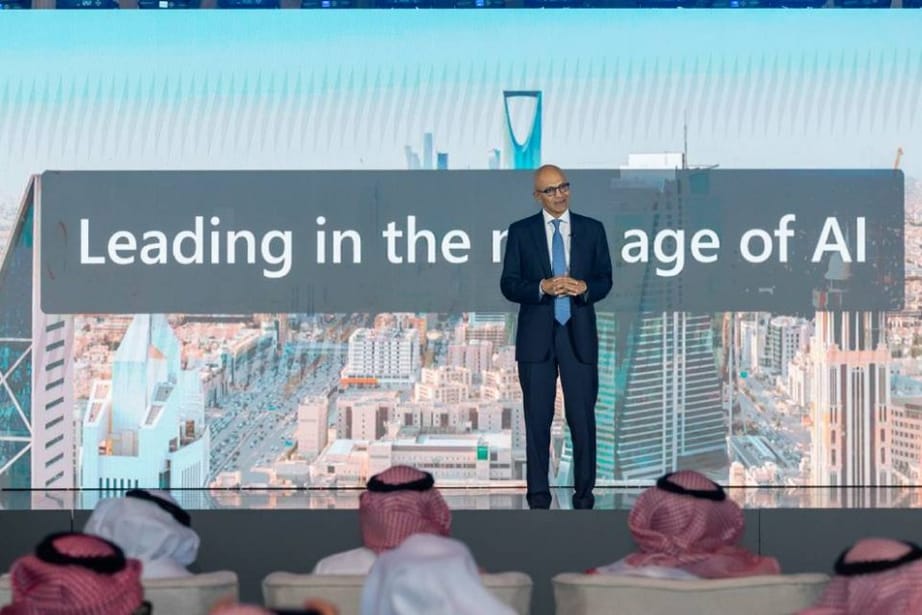
AI For The Arab World
The rise of Arabic-specific AI models in Saudi Arabia is redefining industries with their accessibility and efficiency While generative artificial

Exploring Saudi Arabia’s ambitious leap into the domain of artificial intelligence
By Megha Merani
Saudi Arabia is at the dawn of a technological renaissance, transitioning from its traditional reliance on oil, to a future focused on data and artificial intelligence (AI). This striking pivot is not just a shift in resources but a redefinition of the Kingdom’s development path, anchoring AI as a key driver of its growth. And the shift is marked by substantial investments, research and development efforts, and strategic global partnerships.
An International Data Corporation (IDC) report on global AI expenditure predicts Saudi Arabia will become one of the world’s biggest spenders on the technology. The trend is also part of a broader regional surge in investment with estimates that the Middle East and Africa will spend US$6.4 billion on advancing AI-related technologies by 2026, up from $3 billion in 2023– “the fastest growth rate worldwide over the coming years,” IDC analysts note.
“While many governments around the world have lagged in implementing AI compared to the private sector, the Saudi government has led the charge,” Carrington Malin, a Gulf-based AI consultant who is the Editor of Middle East AI News, says. “Saudi Arabia intends to be a world leader in AI, and it obviously has the ability to use oil revenues to invest heavily where needed. The Kingdom has very ambitious objectives for AI and the value that it can deliver, so AI, data and digital transformation programs are being pushed forward at speed.”
While Gulf states are increasingly investing in AI to reshape their economies, Saudi Arabia, in particular, stands out for its ambitious use of AI in the development of Neom, a $500 billion giga-project that will feature cognitive cities, ports, research centers, entertainment venues, and tourist spots. This futuristic development, dwarfing New York City 33 times over, will converge data-driven intelligence with urban living.
During a visit to Riyadh in November, Satya Nadella, Chairman and CEO of Microsoft, observed the transformative impact and growing influence of AI in Saudi Arabia, affecting both everyday life and business. “It’s great to see so many Saudi organizations across the public and private sector already applying this technology to drive innovation and create new economic opportunities,” he said then. “This next generation of AI will fundamentally transform productivity for individuals and spur innovation for businesses, and industries everywhere– including in Saudi Arabia.”
Nadella also cited examples of local applications of AI across sectors, underscoring their role in opening up new economic opportunities. Among these, the King Faisal Specialist Hospital and Research Center, one of the top hospitals in the Middle East, stands out for its trial of AI in clinical documentation. This speech-to-text solution is three times faster than typing, and it is helping clinicians at King Faisal Hospital to increase their productivity, reduce documentation errors, and spend more time with patients.
Other entities (and industries) are stepping up too. Saudi Airlines is innovating with Saudia, an AI travel companion developed using Azure OpenAI GPT-4, which is poised to revolutionize personalized travel experiences, with the airline also becoming the region’s first to launch an AI travel companion. Meanwhile, ACWA Power, the Kingdom’s largest private sector power and water entity, has adopted Azure AI and Microsoft’s Intelligent Data Platform to enhance employee safety and refine water desalination processes.
Fintech company Sindbad.Tech is utilizing Azure cloud, AI, and automation for auto-trading bots in financial markets, offering a novel approach to retail investment without fund transfers, highlighting a shift in investment strategies. On the healthcare front, the Ministry of Health, which receives up to 20,000 calls per day through its call center, is also leveraging Azure AI for its call center operations, enhancing online medical consultations, case escalations, and automating AI diagnos reports and summarization for medium-low cases.
Additionally, Saudi Arabia ranked second globally in societal awareness of AI, according to the prestigious Stanford University International Index for Artificial Intelligence. And in a striking illustration of its future aspirations, the National Center for Mental Health Promotion in Saudi Arabia has teamed up with UK-based AI mental health startup Iona Mind, to co-develop AI-driven digital therapeutics that support the psychological well-being of the Saudi population– a move towards positioning the Kingdom at the forefront of technological and societal transformation. The partnership stands out in a region where traditional values profoundly shape society, marking a significant cultural evolution.
Iona Mind was created to use AI and cutting-edge technology to advance the state of psychological interventions and make them widely accessible. The startup’s co-founder and clinical director, Professor Paul Farrand, is a world-leading expert in low intensity cognitive behavioural therapy (CBT), as well as a national advisor to the UK’s National Health Services (NHS) Talking Therapies. “We use AI to provide automated support to users completing self-therapy programs,” Jonathan Baker, co-founder and CEO Iona Mind, says. “AI allows us to offer highly personalised support and insights 24/7. Using the Iona Mind platform, culturally adapted versions of core Iona products will be co-developed to ensure they are acceptable and effective in Saudi Arabia.”
Over 30,000 people globally have successfully completed Iona Mind Wellbeing Courses so far, and Iona believes the partnership with Saudi will extend its reach across the wider region. “Our experience has been that there’s a thriving startup and investor ecosystem in Saudi Arabia and we are excited about the possibilities for the future,” Baker adds. “This is a significant long-term relationship where we intend to develop a variety of products for the Saudi population and also other Gulf countries. We will be working to deploy cutting-edge AI within the Kingdom to support a variety of offerings promoting psychological well-being. The intention is that Saudi Arabia become a world leader in evidencebased digital mental health.”
Bashayer AlJanad, founder of AlBain Marketing Agency and the Kindi AI system, highlights the opportunity for AI in niche markets. Her AI-based perfume recommendation system, Kindi, attempts to address the main obstacle of purchasing perfumes online: the inability to smell a fragrance before buying it. Kindi helps online stores in increasing their perfume sales by analyzing customer tastes, and suggesting the best perfumes to meet their preferences.
“The combination of government support, market demand, a young population, and data availability positions Saudi Arabia as a promising landscape for AI startups to flourish and make a significant impact in the region and beyond,” AlJanad says. “AI solutions increase from the efficiency and optimize operations. If the AI startups focus on needs in each industry and how to find a solution to its obstacles, it will make a revolution in the market. In addition, Saudi Arabia’s Vision 2030 has the objective of broadening the country’s economic base and lessening its reliance on oil. AI startups are in line with this vision and have the potential to play a role in advancing the growth of Saudi’s non-oil industries.”
In the corporate realm, Karl Crowther, VP at Alteryx, says businesses in Saudi Arabia are already moving quick to embrace generative AI. “With self-service analytics, organizations can unleash generative AI to its full potential, empowering teams to solve business problems efficiently,” Crowther says. Indeed, PwC estimates that AI is expected to contribute more than $135.2 billion in 2030 to the Saudi economy, equivalent to 12.4% of gross domestic product (GDP).
Ankita Dhawan, Senior Associate Designate at KARM Legal Consultants also points out the Kingdom’s leading role in AI governance. “Saudi Arabia is emerging as a global leader in setting benchmarks in AI regulation,” she notes. “Globally, AI experts are having their ‘Oppenheimer moment,’ and are sounding alarm bells about the ethical and legal concerns related to AI– such as data privacy violations, misinformation, copyright infringement, among many others. In this background, Saudi is emerging as a global leader in setting benchmarks in AI regulation. Saudi has taken a proactive approach to regulating AI responsibly, in a manner where the incentive to innovate and the need to regulate are duly balanced. For example, uniquely, in KSA, data and AI are regulated by the same dedicated regulator- the Saudi Data and Artificial Intelligence Authority (SDAIA). Further, SDAIA recently published its AI Ethics Principles to build a principlebased framework for the development and use of AI that is based on fairness and transparency. In the field of intellectual property, KSA is in the process of revising its laws, to become one of the first jurisdictions globally to discuss works created by AI.”
In 2023, Saudi announced the creation of an International Centre for AI Research and Ethics, which aims to advance legislative frameworks. Alongside, the Kingdom also established the Global Cybersecurity Forum Institute in Riyadh to harness the potential of cyberspace and support efforts to boost cyber safety on a global scale. It also established the Saudi Data and Artificial Intelligence Authority (SDAIA) in 2019 as the central authority responsible for organizing, developing, and overseeing all AI-related matters. In conjunction with Accenture, SDAIA established a national cloud infrastructure and National Data Bank, to enables secure, efficient data sharing between government entities.
Today, the National Data Bank is connected to more than 200 government systems and has led to the establishment of Estishraf, a national insights and analytics platform that supports data-driven decision making and planning. In 2023, more than 85 government entities benefited from Estishraf’s services, resulting in financial savings exceeding $13.3 billion.
For one, King Abdullah University of Science and Technology (KAUST) now operates the Middle East’s most powerful supercomputer, Shaheen III. And two-thirds of KAUST’s faculty groups currently engage in supercomputer activity, and that percentage is expected to increase.
According to Dr. Tony F. Chan, President of KAUST, the new supercomputer takes KAUST’s world-class research capabilities to the next level through its processing power, and ability to create models across many fields in a short period of time. Faculties will use Shaheen III to support the construction and testing of predictive mathematical models, for scientific discovery, engineering design, and to support national projects and policies.
State oil giant Saudi Aramco is also ramping up its R&D efforts through a deal with Nokia Bell Labs and plans to expand AI research teams. The collaboration is expected to develop advanced Industry 4.0/4IR digital use cases and validate proof of concept solutions for various industrial sectors. Commenting on the move, Nabil Nuaim, Senior Vice President of Aramco Digital and Information Technology, said, “This MoU signifies a major step towards digitalizing our industries and transforming our national talent capabilities.” At the same time, Aramco’s $500 million VC fund Wa’ed Ventures had also led a $9 million funding round in Dubai-based cybersecurity startup SpiderSilk to fuel the expansion of its cyber defense technology offering in Saudi Arabia. “For long, KSA has been seen as a traditional, industrial economy,” Karm’s Dhawan adds. “With the sharp focus on technology, we strongly believe that is changing. Saudi is actively encouraging innovation led sectors to prosper by encouraging industry, academia and government partnerships.”
For her part, Kindi AI’s AlJanad points out that the Kingdom’s technology ecosystem is often misunderstood. “Contrary to the perception of limited innovation, the country actively promotes technological advancements through initiatives like Vision 2030, showcasing its commitment to fostering a thriving ecosystem,” she says. “Infrastructure is robust, with state-of-the-art technology parks and innovation hubs providing an ideal environment for startups and entrepreneurs. Market opportunities are abundant across sectors such as healthcare, finance, energy, and smart cities. Cultural barriers are actively addressed, and policies encourage diversity and inclusion. Saudi Arabia invests in developing local talent while attracting global professionals. Recognizing these developments and dispelling misconceptions can unlock greater engagement and collaboration with Saudi Arabia’s dynamic technology ecosystem.”
Echoing this sentiment, Malin concludes by saying, “Saudi Arabia intends to be a world leader in AI, a goal that seems increasingly attainable given its current trajectory.”
Discover the most outstanding articles.اكتشف أبرز المقالات.

Harnessing the power of digital twins to reimagine cities across the KSA and beyond. According to PwC’s 2022 report,

How Riyadh-based The Garage is contributing to a flourishing startup culture in Saudi Arabia In the heart of Riyadh, nestled

Saudi astronauts Rayyanah Barnawi and Ali Alqarni make history in giant leap for the kingdom. From earthbound dreamers to cosmic